
Chip LEDs from Osram Opto Semiconductors are providing the infrared illumination in a new virtual reality headset built by the Japanese start-up company FOVE that integrates eye tracking as a novel means of interaction.
FOVE is a high-end virtual reality (VR) system that allows users to completely immerse themselves in another world, with enclosed headsets shutting them out from their real surroundings. To provide an authentic virtual experience, sensors keep track of users and integrate their position and movements into the virtual action.
Now eye tracking provides another, novel and intuitive way of interacting with virtual reality. Users can select or move an object by just looking at it. They can establish eye contact with virtual characters or trigger actions by focusing their gaze at a certain spot.
Moreover, the technology allows for ‘foveated rendering’, a technique which significantly reduces demands on computing power and graphic cards. Based on the information about the user’s point of gaze, VR systems can adjust the resolution and render areas in the direct field of vision in high resolution while allowing for lower resolution in the periphery.
“We chose Osram IR LEDs because they are high-quality products. They meet all our specifications. One of our main deciding factors was that only very little light lies outside the central emission spectrum and is therefore lost, which meant we could streamline our optical filter design process and maximize our sensor performance,” said Lochlainn Wilson from FOVE.
Eye tracking systems illuminate the user’s eyes with infrared light, register the reflections with an IR sensitive camera sensor and employ special algorithms to determine the user’s direction of gaze and eye movements.
To realise the function inside a headset, several infrared LEDs are mounted around the two lenses. FOVE uses SFH 4053 ChipLEDs from Osram Opto Semiconductors, which are only 0.5 mm x 1.0 mm x 0.45 mm in size. Their emission wavelength of 850 nm matches the spectral sensitivity of the camera sensor and their beam angle of +- 70° ensures an even illumination of the eyes.
“Through collaboration with FOVE, we are the first supplier to provide an eye tracking solution for a VR headset,” said Hiroshi Okuma, marketing manager for ELS (Emitter, Laser, Sensors) at Osram Opto Semiconductors. “With its high efficiency and compact package, the SFH 4053 is ideal for this application.”
Infrared LED for position sensing
FOVE also uses infrared sensor technology to track the user’s position and movements in order to integrate these into the VR action. Several SFH 4253 TOPLEDs from Osram are mounted around the headset. They create a pattern of infrared light dots which are registered and tracked by a camera to determine the user’s movements. At 850 nm, the emission wavelength of the SFH 4253 matches the spectral sensitivity of the photo sensor. The radiation characteristics and package geometry of the emitter also fit the requirements for the application.
